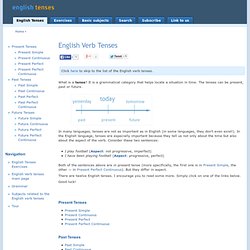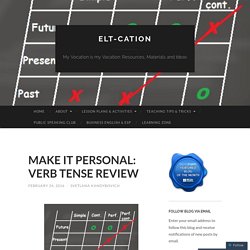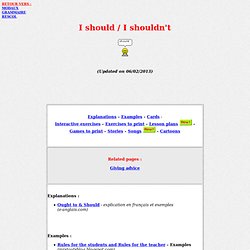

T054 - Global Warming - Present Tense - English Grammar Exercises. Leoxicon: The state of stative verbs. Or why I've stopped teaching them (and why you shouldn't bother with them either) Like for many EFL/ESL teachers, stative verbs used to be a staple of my teaching menu.

I had a great activity for focusing on them, which I have abandoned because I've come to realise that it served no purpose. The activity, which I may have picked up on my CELTA or from Dave's ESL cafe (who remembers it?) , went like this. Groups of 3-4 students (Pre-Intermediate level and up) are given a stack of cards with verbs written on them. Eat drink drive sit fall pray walk And the difficult ones would be: love like admire want understand belong consist Unbeknownst to learners, these 'difficult' ones are coloured in red, which helps during the next stage - clarification. Feelings ('heart' verbs): love, like, admirethinking ('head' verbs): understand, realiseother: belong, own, consist Stative vs. dynamic meanings First of all, it would be more accurate to talk about stative vs dynamic meanings of certain verbs.
Learn English Grammar: Past tenses in English. Have you ever tried telling a story to a friend and well, you start having all sorts of difficulties with the tenses?

Especially the past tenses in English? Like Romain, in today’s lesson. 29. Mystery Story / Narrative Tenses. [DOWNLOAD THIS EPISODE] [LISTEN TO PART 2] [FREE AUDIOBOOK OFFER]This podcast is about narrative tenses (past simple, past continuous & past perfect – see details below). We use these tenses to sequence stories about the past. To master the use of these tenses you have to deal with their form, their use and their pronunciation – both for listening and speaking. Use this podcast to help you deal with all of those things, and then start using narrative tenses fluently whenever you describe something.
Make your descriptions more detailed and colourful! Below you can read the mystery story from the podcast, and then grammar details and a tense review exercise. Listen to the story, and notice the different verb forms being used. Subscribe to Luke’s English Podcast to improve your English every day, and have fun in the process! The mystery story:Last night I was walking home next to the river Thames, when something strange happened to me. I looked up at the man. Pronunciation drills: 1. Mystery Story / Narrative Tenses.
Gerund. IRREGULAR VERBS. What are the English Verb Tenses? Click here to skip to the list of the English verb tenses.

What is a tense? It is a grammatical category that helps locate a situation in time. The tenses can be present, past or future. In many languages, tenses are not as important as in English (in some languages, they don't even exist!). In the English language, tenses are especially important because they tell us not only about the time but also about the aspect of the verb. I play football (: not progressive, imperfect) I have been playing football (: progressive, perfect) Both of the sentences above are in present tense (more specifically, the first one is in Present Simple, the other — in Present Perfect Continuous).
PICTURES. Have got. Phrasal verbs. Infinitive. VERB TENSE REVIEW. One of the ways to make learning more effective is to transit from mechanical practice to more engagement with the target grammar or vocabulary focusing on the use of forms for students’ own production of speech or writing.

My today’s post describes an adaptation of the extended version of Noughts and Crosses (or Tic-Tac-Toe) that offers a higher level of challenge for students turning a tense review into a personally relevant and meaningful activity. For the game, students will need coordinate grids with each square defined by the horizontal axis (Simple, Continuous, Perfect and Perfect Continuous) and the vertical axis (Present, Past and Future). a 3×4 grid – for tenses in active voice, Grid 1. or a 6×4 grid for tenses in active and passive voice. Grid 2. How to play the game: 1. 2. For Grid 1 The player who succeeds in placing three of their marks in a row wins the game.
For Grid 2 The player who succeeds in placing four of their marks in a row wins the game. 2. Before the game*: Happy teaching!
PRESENT SIMPLE. SIMPLE PAST. Like/ love/hate +ING. PAST CONTINUOUS. PRESENT PERFECT. Modals. VERBS/ meaning. CAUSATIVE VERBS. FUTURE. DO or MAKE. English grammar lesson. Irregular Verbs. Make or Do? / ESL Lesson. Visual Chart of Tenses for ESL learners and classes. Subject and Verb Agreement. Grammar : I should - I shouldn't. Explanations : Ought to & Should - explication en français et exemples (e-anglais.com) Examples : Rules for the students and Rules for the teacher - Examples (mrstoutsblog.blogspot.com) Cards : Stereotypes - The perfect European should be THE PERFECT EUROPEAN SHOULD BE...

LIKES AND DISLIKES. Remember + -ing (Gerund) or Remember + To (Infinitive)?